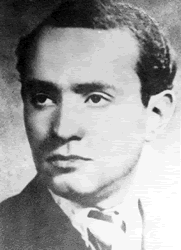Wolf Durmashkin
: typo3.ort.org/index.php?id=142 Wolf Durmashkin. Among the many Jewish artists, musicians and writers of pre-war Vilna, the pianist and conductor Wolf Durmashkin stood out. Born in 1914, by the age of seven he had already started giving public piano recitals. He graduated from the Vilna conservatory of music at the age of 23, and moved briefly to Warsaw to continue his musical training. When war broke out in 1939, Durmashkin decided to return to his home city, where he initially found employment as a conductor and music teacher.
Soon after the Nazis entered Vilna in 1941, he and the tens of thousands of Jews not immediately murdered by the Nazis or their Lithuanian auxiliaries were forced into the cramped confines of the ghetto. There, Durmashkin continued his musical work, composing, organising an orchestra, and helping to create a music school that enrolled over a hundred students. He was also the founder and director of a Hebrew ghetto choir.
The musical world created in Vilna through the commitment of young musicians like Durmashkin was to come to an abrupt and bloody end. In January 1943, a year after the first theatre concert commemorating the mass murders at Ponar, the ghetto soprano Lyube Levitski was rehearsing her role for an upcoming opera, under Durmashkin's direction. Levitski was caught smuggling food into the ghetto for her sick mother, and was arrested and subsequently killed. Shortly thereafter, Durmashkin was deported to the Klooga concentration camp in Estonia during the liquidation of the ghetto. Tragically, he was killed one day before liberation.
SourcesKalisch, Shoshana. (1985). Yes, We Sang! Songs of the Ghettos and Concentration Camps. New York, Harper.
USHMM Photo Archive (biographical information
